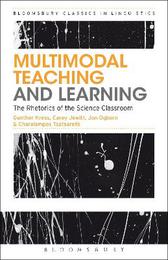
|
Multimodal Teaching and Learning: The Rhetorics of the Science Classroom
Paperback / softback
Main Details
| Title |
Multimodal Teaching and Learning: The Rhetorics of the Science Classroom
|
| Authors and Contributors |
By (author) Gunther Kress
|
|
By (author) Carey Jewitt
|
|
By (author) Jon Ogborn
|
|
By (author) Tsatsarelis Charalampos
|
| Series | Bloomsbury Classics in Linguistics |
|---|
| Physical Properties |
| Format:Paperback / softback | | Pages:248 | | Dimensions(mm): Height 216,Width 138 |
|
| Category/Genre | linguistics |
|---|
| ISBN/Barcode |
9781472522719
|
| Classifications | Dewey:371.1022 |
|---|
| Audience | | Tertiary Education (US: College) | | Professional & Vocational | |
|---|
|
Publishing Details |
| Publisher |
Bloomsbury Publishing PLC
|
| Imprint |
Bloomsbury Academic
|
| Publication Date |
31 July 2014 |
| Publication Country |
United Kingdom
|
Description
This book takes a radically different look at communication, and in doing so presents a series of challenges to accepted views on language, on communication, on teaching and, above all, on learning. Drawing on extensive research in science classrooms, it presents a view of communication in which language is not necessarily communication - image, gesture, speech, writing, models, spatial and bodily codes. The action of students in learning is radically rethought: all participants in communication are seen as active transformers of the meaning resources around them, and this approach opens a new window on the processes of learning.
Author Biography
Gunther Kress is a Professor, Culture Communication and Societies, at IOE, UCL's Faculty of Education and Society, University College London, UK. Carey Jewitt is a Senior Researcher, Culture Communication and Societies, at IOE, UCL's Faculty of Education and Society, University College London, UK. Jon Ogborn is Professor of Science Education, University of Sussex. Charalampos Tsatsarelis is Director of Research and Developments Centre, The Ziridis Schools, Athens.
ReviewsMultimodal Teaching and Learning: The Rhetorics of the Science Classroom achieves the rare goal of explicating multimodality as both theory and practice. This is an importantly concrete analysis, derived from extended, careful, and interdisciplinary observation, which challenges our thinking about how meaning and knowledge are shaped by our modes of communication. The book appeals to a wide range of scholars and practitioners far beyond the science classroom. -- Professor Ron Scollon, Department of Linguistics, Georgetown University
|